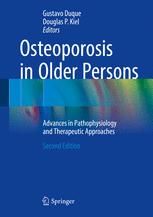

Most ebook files are in PDF format, so you can easily read them using various software such as Foxit Reader or directly on the Google Chrome browser.
Some ebook files are released by publishers in other formats such as .awz, .mobi, .epub, .fb2, etc. You may need to install specific software to read these formats on mobile/PC, such as Calibre.
Please read the tutorial at this link: https://ebookbell.com/faq
We offer FREE conversion to the popular formats you request; however, this may take some time. Therefore, right after payment, please email us, and we will try to provide the service as quickly as possible.
For some exceptional file formats or broken links (if any), please refrain from opening any disputes. Instead, email us first, and we will try to assist within a maximum of 6 hours.
EbookBell Team

5.0
38 reviewsThis new edition includes the most up-to-date information about the pathophysiology and new therapeutic alternatives for osteoporosis of advanced age. It is written by investigators (clinicians and basic scientists) in the field of aging bone research.
It was just recently that a new syndrome, osteoporosis of advanced age, was recognized as a new entity with its own pathophysiology and potential treatments. Unfortunately, and despite the fact that hip fractures are mostly a consequence of this process, and apart from the first edition of this book, there are few publications about this subject.
The first edition of this book demonstrated that there is a need to understand the particular features of osteoporosis in older persons, which is the main aim of this book. The institutions where the authors are affiliated are highly recognized as the main centers in aging bone research. As an innovation, the second edition includes some aspects of muscle and bone interaction focusing of the impact of age-related muscle loss (sarcopenia) on the pathogenesis of falls and fractures in older persons. As in the previous edition, this book is expected to be the reference guide for geriatricians, gerontologists, and bone biologists as well as medical trainees in order to understand the mechanisms of senile osteoporosis with a practical approach to the treatment of its consequences.